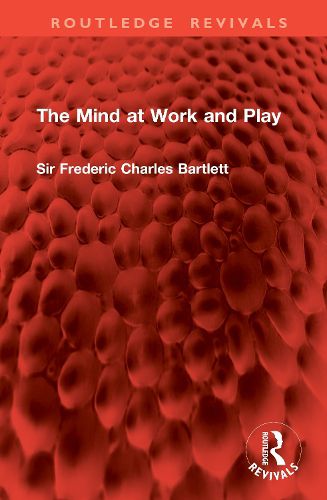Readings Newsletter
Become a Readings Member to make your shopping experience even easier.
Sign in or sign up for free!
You’re not far away from qualifying for FREE standard shipping within Australia
You’ve qualified for FREE standard shipping within Australia
The cart is loading…






First published in 1951, The Mind at Work and Play consists of the 119th series of Christmas lectures given at The Royal Institution in 1948-49. The book raises some important questions like- how can the mind and its senses measure things accurately? What kinds of bodily movements can people make best, and how can a knowledge of these help the design of scientific apparatus and of the working tools and machines of everyday life? How does observation proceed and what are some of its limits? How do people come to connect one event with others? How is it that remembering gets all mixed up with observation, and what actually does happen to things that we try to remember? If you learn one subject or skill does this help or hinder us in learning others? What does the mind do when it "thinks", and can it be trained to think?
Experiments which are within the range of anybody who is interested are described and some of the results that have been obtained from them are discussed. But the main hope is that many of those who may read the book will use it to direct exciting voyages of discovery which they can make for themselves.
$9.00 standard shipping within Australia
FREE standard shipping within Australia for orders over $100.00
Express & International shipping calculated at checkout
Stock availability can be subject to change without notice. We recommend calling the shop or contacting our online team to check availability of low stock items. Please see our Shopping Online page for more details.
First published in 1951, The Mind at Work and Play consists of the 119th series of Christmas lectures given at The Royal Institution in 1948-49. The book raises some important questions like- how can the mind and its senses measure things accurately? What kinds of bodily movements can people make best, and how can a knowledge of these help the design of scientific apparatus and of the working tools and machines of everyday life? How does observation proceed and what are some of its limits? How do people come to connect one event with others? How is it that remembering gets all mixed up with observation, and what actually does happen to things that we try to remember? If you learn one subject or skill does this help or hinder us in learning others? What does the mind do when it "thinks", and can it be trained to think?
Experiments which are within the range of anybody who is interested are described and some of the results that have been obtained from them are discussed. But the main hope is that many of those who may read the book will use it to direct exciting voyages of discovery which they can make for themselves.